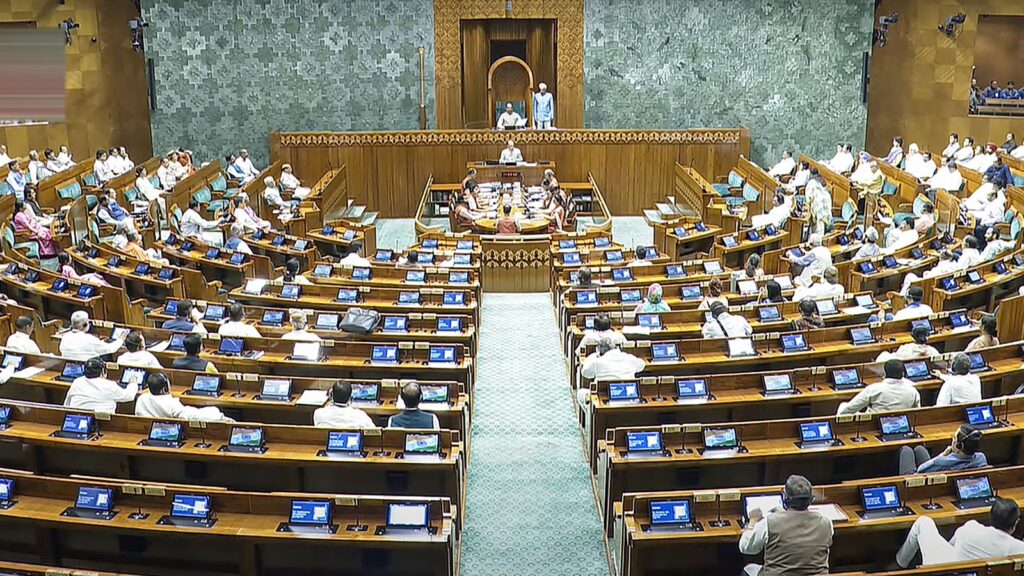Union Home Minister Amit Shah is expected to move in the Lok Sabha on Wednesday the Constitution (130th Amendment) Bill, 2025, which seeks to remove a Central or State Minister who is facing allegations of corruption or serious offences and has been detained for at least 30 days.
The Bill will amend Article 75 of the Constitution, which primarily deals with the appointment and responsibilities of the Council of Ministers, including the Prime Minister.
“A Minister, who for any period of 30 consecutive days during holding the office as such, is arrested and detained in custody, on allegation of committing an offence under any law for the time being in force, which is punishable with imprisonment for a term which may extend to five years or more, shall be removed from his office by the President on the advice of the Prime Minister to be tendered by the 31st day after being taken in such custody,” the Bill states.
The move comes against the backdrop of the controversy that surrounded the arrest in 2023 of V Senthil Balaji, a minister in Tamil Nadu’s DMK government. Tamil Nadu Governor R N Ravi had dismissed Balaji following his arrest in an alleged money laundering case. Chief Minister M K Stalin had then reinstated Balaji after the Supreme Court granted him bail. But after the apex court expressing concern over his return, Balaji was removed in a reshuffle.
According to the statement of objects and reasons attached to the Bill, “a minister who is facing allegations of serious criminal offences, arrested and detained in custody, may thwart or hinder the canons of constitutional morality and principles of good governance and eventually diminish the constitutional trust reposed by people in him.”
It also says that “elected representatives represent hopes and aspirations of the people of India. It is expected that they rise above political interests and act only in the public interest and for the welfare of the people… It is expected that the character and conduct of Ministers holding the office should be beyond any ray of suspicion”.
Article 164 (1) of the Constitution states the Chief Minister shall be appointed by the Governor, and that other Ministers shall be appointed by the Governor on the advice of the Chief Minister and shall hold office at the pleasure of the Governor. However, several court rulings have interpreted that the power of the Governor primarily flows from the “aid and advice” of the Council of Ministers.
Reacting to the proposed Bill, Congress MP Abhishek Singhvi posted on X that the “new proposed law removes incumbent CM, etc, immediately on arrest”. “Best way to destabilise opposition is to unleash biased central agencies to arrest oppo(sition) CMs and despite being unable to defeat them electorally, remove them by arbitrary arrests. And no ruling party incumbent CM ever touched,” he posted.
On Tuesday, Shah wrote to Lok Sabha Secretariat, informing Secretary General Utpal Kumar Singh that the Union Home Ministry also intends to move an amendment to the Union Territory Administration Bill in the ongoing Monsoon session.
According to sources, the revised list of Government business for Wednesday will include the Constitution (130th Amendment) Bill, 2025; The Government of Union Territories (Amendment) Bill, 2025; The Jammu and Kashmir Reorganisation (Amendment) Bill 2025; and, Promotion and Regulation of Online Gaming Bill, 2025.
Almost all of these Bills, except the one related to online gaming, are likely to go to a Joint Committee of both the Houses for further scrutiny and discussion after their introduction in the Lok Sabha.
While the Constitutional Amendment Bill applies to all states, Union Territories are governed through a separate legislative framework. For J&K, the Government moved an amendment to the J&K Reorganisation Act and for the other UTs, the amendment is being made to the Government of Union Territories Act, 1963.
UTs have a distinct constitutional and administrative status compared to states, and are directly governed by the Central Government, typically through an appointed Lieutenant Governor or Administrator. Therefore, if an amendment affects both states and UTs, separate but related legislation is introduced to cover UT-specific provisions and to bring their laws in conformity with the amended Constitution.
In his letter to the Lok Sabha Secretary, Shah also sought leniency in the rules of the House for moving the Bills without the required notice.
According to Rule 19A of the Lok Sabha’s Rules of Procedure, the minister should give prior notice before introducing a Bill in the Lok Sabha. Additionally, Rule 19B, which is related to 19A, states that Government Bills should be circulated to all members of the Lok Sabha before they are formally introduced to allow members time to review them and prepare for discussion. The Government wanted leniency in these key rules as there was not enough time with the Monsoon session ending on August 21, sources said.

